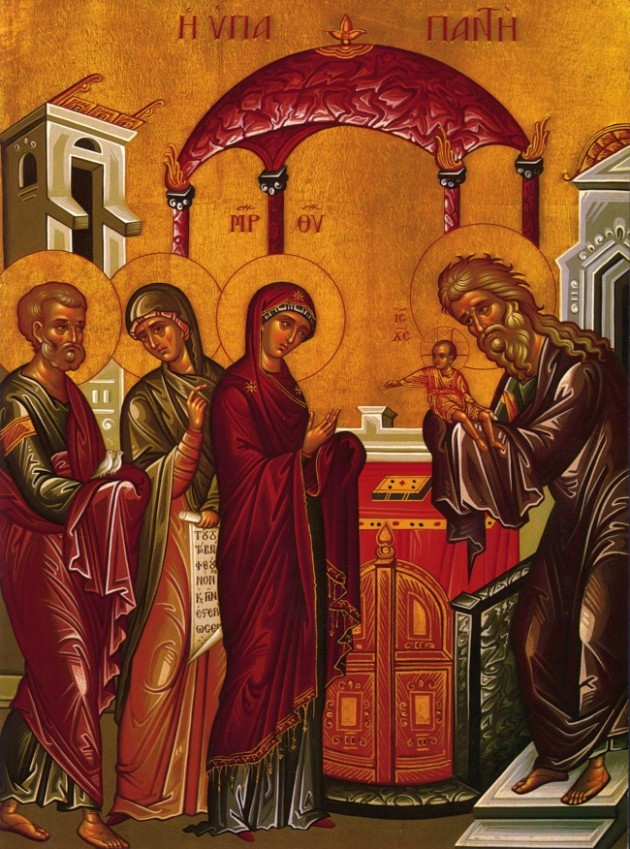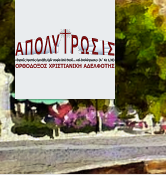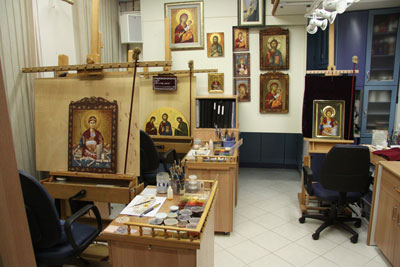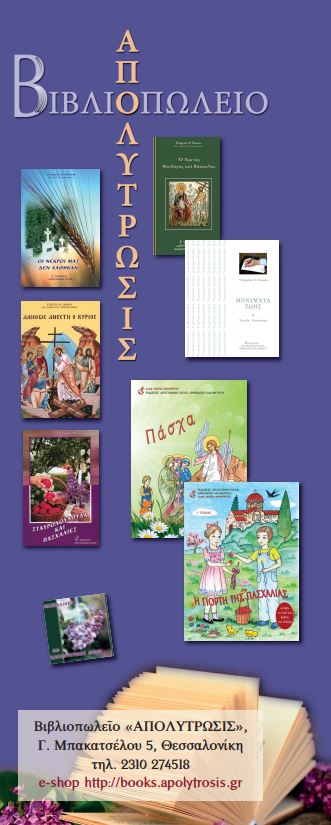Translation from the book:
Στεργίου Ν. Σάκκου, Ἑρμηνεία στό κατά Λουκᾶν Εὐαγγέλιο, τόμ. Α΄,
ἐκδ. «ΧΡΙΣΤΙΑΝΙΚΗ ΕΛΠΙΣ» ΟΡΘΟΔΟΞΗ ΑΔΕΛΦΟΤΗΤΑ, Θεσ/νίκη 2008, σσ. 108-121
(Stergios N. Sakkos [Read CV], A Commentary on the Gospel according to St. Luke, vol. A', pp. 108-121)
2,22. Καὶ ὅτε ἐπλήσθησαν αἱ ἡμέραι τοῦ καθαρισμοῦ αὐτῶν κατὰ τὸν νόμον Μωϋσέως, ἀνήγαγον αὐτὸν εἰς Ἰεροσόλυμα παραστῆσαι τῷ Κυρίῳ.
2:22 And when the time came for their purification according to the law of Moses, they brought him up to Jerusalem to present him to the Lord.
According to the Mosaic ritual, forty days after the birth of a male child and eighty days after the birth of a female child, the mother and her newborn were to present themselves in the temple and offer the appointed sacrifice for the mother’s legal purification (see Lev ch. 12). The Virgin Mary, of course, had no need of purification, because she conceived her son supernaturally by the Holy Spirit and gave birth to him without suffering the slightest bodily injury or change. However, she accepted the purification as her son who accepted the circumcision, so that she would not appear to be breaking the Mosaic law.
Many fathers and scripture interpreters maintain that the Virgin gave birth to Jesus without pains. This is indeed very likely, both because the infant was of divine origin and because the mother was of exceptional holiness. The mother of the Son of God was not included in the curse that was heard for Eve when she sinned; "in sorrow you shall bring forth children" (Gen 3:16). In the 12th chapter of Revelation, of course, the "woman clothed with the sun", a symbol of the Most Holy Virgin and of the whole Church, appears to have childbirth pains (see Rev 12:1-2). But that is a symbolic expression; it indicates the pain which like a sword struck Virgin Mary’s heart according to Simeon’s prophecy (see v. 35), as well as the difficulties and problems which the enlisted faithful in the Church encounter in all ages.
Along with the mother’s purification, the dedication of the firstborn boy to God took place. The verb to “present=παραστῆσαι” occurs very often in the Holy Bible as a term denoting the presentation of the sacrifices on the altar during the Levitical worship. It is also used for the presentation of slaves to masters, of workers to employers, of subjects to the king, of soldiers to the general, of the bride to the bridegroom; finally, for the complete surrender of believers to God (see Rom 12:1).
2,23. καθὼς γέγραπται ἐν νόμῳ Κυρίου ὅτι πᾶν ἄρσεν διανοῖγον μήτραν ἅγιον τῷ Κυρίῳ κληθήσεται.
2:23 as it is written in the Lord’s law that every male that opens the womb shall be called holy to the Lord.
On the night of the exodus of the Israelites from Egypt, God smote the Egyptians’ firstborns. The Jews’ firstborns were saved by the blood of the lamb, which they spread on the doorposts of their houses. From then on, every firstborn son was "holy", dedicated to God’s service (see Ex 13:2). Because God chose the Levites to serve him instead of these firstborns (see Num 3:12), the Jews could redeem their firstborns by paying the price of 5 shekels to the temple (see Num 18:15-16). Not only first-born children were considered 'holy', but also the first-born of domestic animals and the first-fruit (see Ex 22:29-30) which were offered to the temple.
2,24. καὶ τοῦ δοῦναι θυσίαν κατὰ τὸ εἰρημένον ἐν νόμῳ Κυρίου, ζεῦγος τρυγόνων ἤ δύο νεοσσοὺς περιστερῶν.
2:24 and to offer a sacrifice according to that which is said in the Lord’s law, a pair of turtle doves or two young pigeons.
On the day of the purification of the mother and the child’s dedication, the parents in addition to the sum of five shekels which they offered to the temple, sacrificed a one-year- old lamb and a young pigeon or a turtle dove. If they were poor, the law required them to offer a pair of turtle doves or two small pigeons (see Le 12:6.8). From the fact that only the second case is mentioned in this verse, we conclude that Joseph and Mary were poor.
2,25. Καὶ ἰδοὺ ἦν ἄνθρωπος ἐν Ἰεροσολύμοις ᾧ ὄνομα Συμεών, καὶ ὁ ἄνθρωπος οὗτος δίκαιος καὶ εὐλαβής, προσδεχόμενος παράκλησιν τοῦ Ἰσραήλ, καὶ Πνεῦμα ἦν Ἅγιον ἐπ᾿ αὐτόν.
2:25 Now there was a man in Jerusalem, whose name was Simeon, and this man was righteous and devout, waiting for the consolation of Israel, and the Holy Spirit was upon him.
The event of the legal purification of the Blessed Mother and Jesus’ dedication is connected to an encounter. Two people from the chosen remnant of Israel, Simeon and Anna, met the Messiah, whom they had been longing for. For this reason, the corresponding despotic feast which our Church has set forty days after Christmas is called "The Meeting of the Lord in the Temple" (υπαπαντή = meeting).
It has been suggested that Simeon was one of the Septuagint members who translated the Old Testament, that he was a high priest or rabbi, father of Gamaliel. This information, however, is inaccurate; it comes mainly from apocryphal texts. If Simeon had anything to do with the priesthood, Luke would have clearly stated it along with the other details of his identity. Simeon was a simple and faithful man, like the shepherds and the prophetess Anna.
Besides his name and place of residence, we also learn that he was “righteous and devout”, which means that he was a God’s man. Some interpreters believe that the designation “devout” refers to his relationship with God, while “righteous” refers to his relationship with people. In the Bible, however, the pious and godly are also described "righteous" (see comments on 1:6). In other words, two words are used here which express the same meaning (the form "in twofold = ἕν διά δυοῖν").
Simeon was a man of “waiting for”, looking forward with intense desire and deep longing, to “the consolation of Israel” i.e., the Messiah. The verb "παρακαλῶ" means "to comfort, to support". In general, it denotes the work of spiritual support and spiritual cultivation. Simeon waited for God to send the Paraklitos (= Comforter) Messiah, to strengthen and cultivate the nation of Israel, to fulfill its expectations.
Finally, it is emphasized that “the Holy Spirit was upon him”, so that Simeon's prophetic character could be seen. He, after Elizabeth (1:42-45) and Zechariah (1:68-79), proclaimed that the Messiah had come.
2,26. καὶ ἦν αὐτῷ κεχρηματισμένον ὑπὸ τοῦ Πνεύματος τοῦ Ἁγίου μὴ ἰδεῖν θάνατον πρὶν ἢ ἴδῃ τὸν Χριστὸν Κυρίου.
2:26 and it had been revealed to him by the Holy Spirit that he should not see death before he had seen the Lord's Anointed One.
Simeon was informed by the Holy Spirit, “it had been revealed to him by the Holy Spirit” -whether by an angel or by a vision-, that he would not see death, he would not die, before he had seen the Messiah.
“Lord's Anointed One” is called the one anointed by God the Father, he is the one sent to bring salvation to the race of men (see 2:11). Jesus is, indeed, the one sent by God the Father, but at the same time he is also the Lord and God himself.
2,27-28. Καὶ ἦλθεν ἐν τῷ Πνεύματι εἰς τὸ ἱερόν· καὶ ἐν τῷ εἰσαγαγεῖν τοὺς γονεῖς τὸ παιδίον Ἰησοῦν τοῦ ποιῆσαι αὐτοὺς κατὰ τὸ εἰθισμένον τοῦ νόμου περὶ αὐτοῦ, καὶ αὐτὸς ἐδέξατο αὐτὸν εἰς τὰς ἀγκάλας αὐτοῦ καὶ εὐλόγησε τὸν Θεὸν καὶ εἶπε.
2:27-28 And he came by the Spirit into the temple; and when the parents brought in the child Jesus, to do for him according to the custom of the law, he took him up in his arms and blessed God and said.
 Simeon came “by the Spirit”, by the exhortation of the Holy Spirit, into the temple. At that moment the holy family came there to fulfill what the Mosaic law prescribed. Luke does not hesitate to use the word "parents" for the virgin Mary and Joseph. They appeared and acted, according to the divine counsel, in this capacity at that time.
Simeon came “by the Spirit”, by the exhortation of the Holy Spirit, into the temple. At that moment the holy family came there to fulfill what the Mosaic law prescribed. Luke does not hesitate to use the word "parents" for the virgin Mary and Joseph. They appeared and acted, according to the divine counsel, in this capacity at that time.
The elder Simeon is called "God holder = θεοδόχος" because he held the divine infant in his arms. He touched God himself in his heart, which overflowing with love and happiness burst out in hymn and praise.
2,29-32. νῦν ἀπολύεις τὸν δοῦλόν σου, δέσποτα, κατὰ τὸ ῥῆμά σου ἐν εἰρήνῃ, ὅτι εἶδον οἱ ὀφθαλμοί μου τὸ σωτήριόν σου, ὃ ἡτοίμασας κατὰ πρόσωπον πάντων τῶν λαῶν, φῶς εἰς ἀποκάλυψιν ἐθνῶν καὶ δόξαν λαοῦ σου Ἰσραήλ.
2:29-32 Lord, now let your servant depart in peace, according to your word, for my eyes have seen your salvation, which you have prepared in view of all peoples, a light for revelation to the Gentiles and for the glory of Israel, your people.
The verb "depart (= ἀπολύω)" (cf. Ge 15:2; Num 20:29) is synonymous with "ἀναλύω" (see Phil 1:23; 2 Tim 4:6). The verb "ἀναλύω" is used literally of soldiers and travellers, who "ἀναλύουν" unload their cargo, when they reach their destination. The "ἀπολύω" is literally used of ships tied up in port; they "ἀπολύουν" them, untie them to leave the port and open out to sea. Death is an unloading and a departure. The soul unloads the burden of the body and freely departs from this earth for the port of heaven.
Simeon called himself a “servant” and addressed God by calling him “Lord”. The status of a captive servant was surely the most terrible and degrading thing for man who was created to be free. But for the believers it is a title of honor to be called "Lord’s servants". The apostles refer to this title with modest boasting (see Rom 1:1; Phil 1:1; Tit 1:1; Jas 1:1; Jude 1; Rev 1:1).
The venerable old man succeeded in receiving into his arms the redeemer whom the ages had been waiting for. “According to” the Lord's “word”, according to the divine promise, the strongest desire of his life was fulfilled. He saw not by faith nor by desire and hope, but with his own eyes Messiah’s coming. That is why he departs this world “in peace”.
The word “salvation”, which is often mentioned in the Old Testament, means the Lord’s saving and redeeming work in general, but especially the Savior Himself. Simeon managed to see in Jesus’ person the one all the prophets expected and longed to see.
God planned and prepared salvation for all the peoples of the earth. Simeon referred to the universality of salvation by saying that was “prepared in view of all peoples”. Furthermore, in the prophecies of the Old Testament despite the narrow nationalistic spirit of that time, there is clear reference to universal salvation, too. The prophet Isaiah clearly declares: "The Lord hath made bare his holy arm in the eyes of all the nations; and all the ends of the earth shall see the salvation of our God" (52:10).
The “salvation” is clarified by the “light” and “glory”, and the “peoples” by the “Gentiles” and “Israel”. It is appropriately said about the Gentiles, who were deprived of the true knowledge of God and divine revelation, that they will be given the light that will dispel the darkness of error and ignorance, so that the truth may shine in their eyes. Messianic salvation and the Messiah were already announced by the prophets as "the light of the Gentiles" (Is 42:6; 49:6; 51:4). The Messiah is glory for Israel, God's people, for "salvation is of the Jews" (Jn 4:22).
Simeon’s hymn possesses a special place in the worship of our Church. It is heard by the priest at the end of the Vespers service. In this solemn service, which reminds us that as the day ends, so will our lives, Simeon’s hymn is an exhortation; to be ready at any moment to surrender ourselves into the Lord’s arms and to be with him in the land of the living.
2,33. Καὶ ἦν Ἰωσὴφ καὶ ἡ μήτηρ αὐτοῦ θαυμάζοντες ἐπὶ τοῖς λαλουμένοις περὶ αὐτοῦ.
2:33 And Joseph and his mother marveled at what was said about him.
Joseph and the child’s mother listened with admiration to Simeon’s prophetic words (cf. Lk 2:18).
2,34. Καὶ εὐλόγησεν αὐτοὺς Συμεὼν καὶ εἶπε πρὸς Μαριὰμ τὴν μητέρα αὐτοῦ· ἰδοὺ οὗτος κεῖται εἰς πτῶσιν καὶ ἀνάστασιν πολλῶν ἐν τῷ Ἰσραὴλ καὶ εἰς σημεῖον ἀντιλεγόμενον.
2:34 And Simeon blessed them and said to Mary his mother; behold, this child is set for the fall and uprising of many in Israel and for a sign which shall be spoken against.
The old man Simeon, by the right which his age gave him, “blessed” Joseph and Mary, and invoked for them God’s grace and blessing. Then he turned only “to Mary”, because enlightened by the Holy Spirit he knew that she was the child’s mother while Joseph was only their caretaker.
The best commentary for Simeon's prophecy, “behold, this child is set for the fall and uprising of many in Israel and for a sign which shall be spoken against”, is the History itself. The Lord was rightly described as "a stumbling stone and a rock of offence" (Rom 9:33; cf. Is 8:14); those who stumbled upon him, either tumbled into the abyss, or were hurled into the heights of divine grace. Apostle Paul wrote accurately: “For the preaching of the cross is to them that perish foolishness; but unto us which are saved it is the power of God." (1 Cor 1:18). Those who were scandalized by the humiliation of the cross and rejected Christ, were cut off from salvation. But those who embraced Lord’s cross became partakers of his resurrection. He himself said that he came into the world as light. Those who do evil works hate the light and shun it. On the contrary, those who are connected to the truth approach him fearfully and in love (see Jn 3:19-21). It is a fact that no name has been fought with such cruelty, with such terrible fury, with vicious slanders and with abysmal malice as Jesus’ name. But also, no name was loved with more power and touching devotion than Jesus’. The presence of the God-Man, as it divided history in the B.C. and A.D. eras, in the same way it divided mankind into two factions - those who hated and fought him and those who believed and loved him.
2,35. Καὶ σοῦ δὲ αὐτῆς τὴν ψυχὴν διελεύσεται ῥομφαία, ὅπως ἂν ἀποκαλυφθῶσιν ἐκ πολλῶν καρδιῶν διαλογισμοί.
2:35 And a sword will pierce through your own soul also, that the thoughts of many hearts may be revealed.
Some interpreters, taking the word “sword” literally, have argued that the Virgin Mary died a martyr's death. But this is not attested by tradition. Simeon did not refer to martyrdom of the body but of the soul. He used a very characteristic expression to prophesy the pain of Jesus' mother at the death of her son. This prophecy was fulfilled when the virgin Mary saw Jesus on the cross. Simeon implicitly prophesied that the Messiah was vulnerable. As sinless, of course, he was immortal. But he willingly endured crucifixion and burial, in order to redeem man from death and sin. Through Simeon’s prophecy, the Virgin was also prepared for the tribulation that would pierce her heart.
According to Simeon's prophecy, the Lord's death on the cross indeed manifested the thoughts of many, “that the thoughts of many hearts may be revealed”. The different attitude which the two thieves took towards the Crucified One (see Lk 23:39-43), the centurion’s confession (see Mt 27:54; Mk 15:39; Lk 23:47), the courage of Joseph's from Arimathea (Mt 27:57; Mk 15:43; Lk 23:50; Jn 19:38), and the betrayal of Judas (Mt 26:47-51; Mk 14:43-46; Lk 22:47-48; Jn 18:3-5), were some of the fulfillments of this prophecy.
2,36-37. Καὶ ἦν Ἄννα προφῆτις, θυγάτηρ Φανουήλ, ἐκ φυλῆς Ἀσήρ· αὕτη προβεβηκυῖα ἐν ἡμέραις πολλαῖς, ζήσασα ἔτη μετὰ ἀνδρὸς ἑπτὰ ἀπὸ τῆς παρθενίας αὐτῆς, καὶ αὐτὴ χήρα ὡς ἐτῶν ὀγδοήκοντα τεσσάρων, ἣ οὐκ ἀφίστατο ἀπὸ τοῦ ἱεροῦ νηστείαις καὶ δεήσεσι λατρεύουσα νύκτα καὶ ἡμέραν.
2:36-37 And there was a prophetess, Anna, the daughter of Phanuel, of the tribe of Asher; she was of a great age, and had lived with her husband seven years from her virginity, and then being a widow of eighty-four years. She did not depart from the temple, worshiping with fasts and prayers night and day.
To the prophets’ line, who prophesied of Jesus, a venerable widow was added. St Ambrose observed that "Simeon prophesied, the Virgin had prophesied, the married (Elizabeth) had prophesied, the widow should also prophesy, so that no condition of life and no sex is left out".
The evangelist Luke gives us the clues to the identity of this widow. Her name was Anna, a Hebrew name meaning "grace", and she was described as a prophetess. A "prophet" is one who, having the holy Spirit, comforts, edifies, supports and moreover often reveals secrets of the heart or prophesies the future (see 1 Cor 14:1-5). Anna was Phanuel’s daughter and belonged to the tribe of Asher. She was of advanced age. After seven years of marriage, she was widowed. “Eighty-four years” old may refer to the years of her widowhood, but it is more likely to indicate her age.
The expression “she did not depart from the temple” does not certainly mean that she dwelt in the temple. Luke, using an exaggerated expression, shows that Anna persistently worshipped God by fasts and prayers; she did not miss any of the services held in the temple.
Her venerable age, her pure widowhood and her great devotion to God made her worthy of the prophetic gift.
2,38. καὶ αὕτη αὐτῇ τῇ ὥρᾳ ἐπιστᾶσα ἀνθωμολογεῖτο τῷ Κυρίῳ καὶ ἐλάλει περὶ αὐτοῦ πᾶσι τοῖς προσδεχομένοις λύτρωσιν ἐν Ἰερουσαλήμ.
2:38 and coming up just at that moment, she gave thanks to God, and spoke about him to all who were expecting the redemption in Jerusalem.
While Simeon was prophesying, Anna “coming up”, standing near, as a second witness, joined with him in her prophecy and thanksgiving to the Lord. It is a scriptural saying; "at the mouth of two witnesses, or at the mouth of three witnesses, shall the matter be established" (Deut 19:15).
The preposition "ἀντί" in the verb “ἀνθωμολογεῖτο” includes the meaning of owing thanksgiving for a deed of benevolence. The evangelist does not save Anna's words. But it is possible that the pious old woman repeated Simeon's prophecy. After leaving the temple, she “spoke about him” about Jesus “to all who were expecting the redemption” who were eagerly waiting for what God had promised.
Jesus was born in a manger humbly and secretly, but heaven proclaimed the event by the star and the angels. Similarly, now Simeon and Anna revealed who this infant was to those who were eagerly awaiting the Messiah. He came to the temple, informally, like any Hebrew child. They assured that this is the one who during Solomon’s time, like a bright cloud covered the newly built temple. Now his inaccessible majesty was hidden under the poor swaddling-clothes in a humble mother’s arms. For what human eyes could bear to face his divine glory and the company of his angels?
2,39. Καὶ ὡς ἐτέλεσαν ἅπαντα τὰ κατὰ τὸν νόμον Κυρίου, ὑπέστρεψαν εἰς τὴν Γαλιλαίαν εἰς τὴν πόλιν ἑαυτῶν Ναζαρέτ.
2:39 Then, as soon as they had accomplished everything according to the Lord’s law, they returned to Galilee to their own town Nazareth.
Joseph and the virgin Mary, after “they had accomplished everything according to the Lord’s law”, concerning the purification of the mother and the child’s dedication, returned “to Galilee to their own town Nazareth”, their permanent dwelling-place.
This verse has been used by some as an argument against the reliability of the God-inspired Gospel text. They pointed out that the Gospel according to Luke was in an alleged disagreement with the Gospel according to Matthew, which narrates the worship of the Wise Men, the slaughter of infants and the flight to Egypt (see chapter 2). However, there is absolutely no such a disagreement or contradiction. A careful study of the two Gospels will help us to reconstruct the whole scene of Jesus’ birth. When Joseph was informed by God’s revelation about the divine plan and called to serve as the Messiah’s support, he decided to dedicate himself to this work. His forced travel to Bethlehem because of the census, gave him the opportunity to move away from the infamous village of Nazareth and from his children, who had already grown up and could live on their own. Joseph took with him the virgin Mary, who as a woman, was possibly not obliged to register.
After Jesus’ birth, Joseph, as a "τέκτων" i.e., a craftsman, easily found work and settled in Bethlehem. From there, he set out with the infant and his mother to accomplish the purification and dedication in the Temple of Jerusalem (see Lk 2:22-38) and returned again to Bethlehem, to "the house", where, according to Matthew (2:11), the Wise Men found the newborn king. Of course, it took about six months or maybe even a year for the Wise Men to prepare and make their long journey "from the east" (Mt 2:1). Herod, who "according to the time which he had diligently enquired of the wise men” to be sure, ordered that the children to be slaughtered should be "from two years old and under". After the Wise Men’s worship Joseph, by God's command, received the child and his mother, left Bethlehem and departed for Egypt (see Mt 2:13-14).
When there was not any danger for the life of the newborn child, since Herod had died, Joseph was again instructed to return (see Mt 2:19-21). He planned to settle in Bethlehem until God would direct him again, but he feared the new king of Judea, Archelaus, son of the slayer Herod. With divine prompting he headed for Galilee and settled in Nazareth. So, the prophecy was fulfilled "that the Messiah shall be called Nazarene" (see Mt 2:21-23). This was God's plan; that Jesus should be called Nazarene, thought to be Joseph’s son, "for a season" until the mystery of the divine economy would be revealed.
Luke omits what Matthew writes and starts with the settlement of the holy family in Nazareth at the exact point where the story of Jesus’ birth closes. There Jesus would stay until the time came for his public ministry.
2,40. Τὸ δὲ παιδίον ηὔξανε καὶ ἐκραταιοῦτο πνεύματι πληρούμενον σοφίας, καὶ χάρις Θεοῦ ἦν ἐπ᾿ αὐτό.
2:40 And the child grew and became strong in spirit and full of wisdom, and the grace /favour of God rested upon him.
In Luke's narrative we find expressions that characterize the various stages of Jesus' life, such as "fruit of your womb" (1:42); "infant" (2:12); "child" (2:40); "child" (2:43); "a man prophet" (24:19). These expressions indicate that the Lord did not appear in an adult’s stature, as Adam and Eve did. He followed as a perfect man the natural growth, sanctifying both infancy and childhood.
The expression "the child grew and became strong in spirit” is used by Luke also for John the Baptist (see 1:80). It means the physical growth and spiritual maturity that a child shows as he grows up. The divinity, of course, which was united with the human nature, remained unaltered.
The God-inspired writer adds “full of wisdom”, to indicate that over the years the wisdom that Jesus had as a man was being perfected. As his body showed a normal growth, so his intellect gradually received all Knowledge. At every age, of course, he had the perfect form of knowledge that no other man had to this degree. But he did not want to make use of his omniscience. He progressed in wisdom through the various experiences he had as a man and not through his divine power (cf. v. 52).
The word “grace” denotes God’s favour, which comes from his complete satisfaction in the sinless Jesus, his beloved Son.
Copyright © 2021 by Orthodox Christian Association «ΧΡΙΣΤΙΑΝΙΚΗ ΕΛΠΙΣ» ΟΡΘΟΔΟΞΗ ΑΔΕΛΦΟΤΗΤΑ. Used by permission. All rights reserved.









